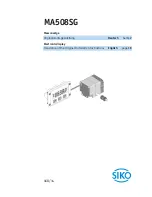
MAN1106-07-EN_XL+_UserManual
M a y 6
t h
, 2 0 2 0
P a g e 113 | 192
Configure the Ethernet Module parameters as follows:
IP Address: Enter the static IP Address for the Ethernet Module being configured.
NOTE:
IP Addresses are entered as four numbers, each ranging from 0 to 255. These
four numbers are called octets, and they are always separated by decimal points.
Net Mask: Enter the Net Mask (sometimes called Subnet Mask) being used by all nodes on the
local network. Typical local networks use Class C IP Addresses, in which case the low octet
(rightmost number) is used to uniquely identify each node on the local network. In this case,
the default Net Mask value of 255.255.255.0 should be used.
Gateway: Enter the IP Address of a Gateway Server on the local network that allows for
communication outside of the local network. To prevent the Ethernet Module from
communicating outside the local network, set the Default Gateway IP Address to 0.0.0.0 (the
default setting).
Status Register: Enter an OCS Register reference (such as %R100) to indicate which 16-bit OCS
register will have the Ethernet Status Word written to it. Table 7.3 shows how this register value
is formatted and explains the meaning of each bit in the Status Word.
Ethernet Status Word Register Format
High Byte
Low Byte
Bit
16
Bit
15
Bit
14
Bit
13
Bit
12
Bit
11
Bit
10
Bit
9
Bit
8
Bit
7
Bit
6
Bit
5
Bit
4
Bit
3
Bit
2
Bit 1
0
0
Dup
Sp
d
0
Rx
Tx Link
TCP Connections
Status Bit(s)
Status Indication
Status Values
Minimum
Maximum
0
Reserved
Always 0
Dup
Link Duplex (Auto-Negotiated)
0 = Half
Duplex
1 = Full Duplex
Spd
Link Speed (Auto-Negotiated)
0 = 10MHz
1 = 100/1000MHz
Rx
Receive State
0 = Inactive
1 = Active
Tx
Transmit State
0 = Inactive
1 = Active
Link
Link State
0 = Down
1 = Up
TCP Connections
Total Number of Active TCP
Connections
(CsCAN, SRTP, Modbus, EIP, FTP, HTTP)
0
40
Table 12.3
–
Ethernet Status Word Register Format
















































